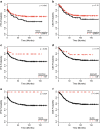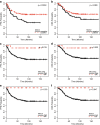MUC1, MUC2, MUC5AC, and MUC6 in colorectal cancer: expression profiles and clinical significance
- PMID: 27298226
- PMCID: PMC5007278
- DOI: 10.1007/s00428-016-1970-5
MUC1, MUC2, MUC5AC, and MUC6 in colorectal cancer: expression profiles and clinical significance
Abstract
Mucin glycoprotein expression can be altered during the carcinogenic process. The impact on the prognosis of patients with colorectal cancer (CRC) is controversial. We analyzed tumors from 381 patients for MUC1, MUC2, MUC5AC, and MUC6 expression by immunohistochemical staining, using tissue microarrays. Progression-free and cancer-specific survival were determined using the Kaplan-Meier method. Expression of intestinal mucin MUC2 was lost in 85 (23 %) CRCs, and patients with MUC6-negative tumors showed shorter progression-free survival (PFS, p = 0.043). Gastric mucins MUC5AC and MUC6 showed high (>50 %) aberrant expression in 28 (8 %) and 9 (2 %) cases, respectively. High expression of MUC5AC was associated with longer PFS (p = 0.055). High expression of MUC6 was associated with 100 % PFS (p = 0.024) and longer cancer-specific survival (CSS, p = 0.043). MUC1 was expressed in 238 (64 %) tumors and had no impact on outcome. When analysis was restricted to stages II and III, loss of MUC2 was associated with adverse outcome. Overexpression of both MUC5AC and MUC6 significantly predicted favorable PFS and CSS. In conclusion, loss of MUC2 expression proved to be a predictor of adverse outcome, while the gain of aberrant expression of MUC5AC and particularly of MUC6 was associated with favorable outcome in CRC, notably in intermediate stages II and III.
Keywords: Immunohistochemistry; Large intestine; Mucin; Prognosis; Prognostic factor; Stage II.
Conflict of interest statement
Compliance with ethical standards Institutional Review Board approval was obtained from the Ethics Committee of the Medial University of Graz, Austria. Conflict of interest The authors declare that they have no conflict of interest.
Figures




References
MeSH terms
Substances
LinkOut - more resources
Full Text Sources
Other Literature Sources
Medical
Research Materials
Miscellaneous

